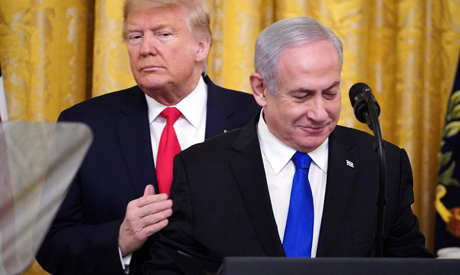
Palestinians staged protests against Trump’s Middle East peace plan, hours before it was unveiled in Washington. Further rallies are expected in the coming days (photo: AFP)
On Saturday Arab foreign ministers are expected to meet at the request of Palestinian leader Mahmoud Abbas to deliver what the Palestinian Authority (PA) hopes will be a firm rejection of the peace proposal that US President Donald Trump put forward on Tuesday evening.
Abbas has made no secret of his rejection of the proposal. He has repeatedly said the US plan is less about peace than eliminating Palestinian rights.
Earlier in the week Abbas refused to take a call from Trump. And on Tuesday, just before Trump made his deal public, Abbas went way beyond the borders of diplomacy, calling Trump a “dog and the son of a dog”.
On Tuesday evening, Middle East time, Trump unveiled what he said was the most detailed document ever, in 80 pages, with “a conceptual map” for a final peace settlement.
Speaking in a White House room packed with American and Israeli officials as well as the ambassadors of Oman, Bahrain and the United Arab Emirates, Trump and acting Israeli Prime Minister Benyamin Netanyahu spoke about a deal that grants Israel control over large parts of the West Bank, allows it to annex the Jordan Valley and envisages Jerusalem as “Israel’s undivided capital”.
Trump asked the Palestinians to work to earn statehood in the future, promising economic support to help create jobs and alleviate poverty. But for this to happen Trump said the Palestinians must end what he qualified as hostility and incitement against Israel. Netanyahu was more specific. He insisted on “disarming Hamas and demilitarising Gaza”.
Trump said he had sent Abbas a letter encouraging him to work for peace at a time when Netanyahu “was taking a major step towards peace”.
Prior to announcing a peace plan that reverses every previous initiative made by the US and which flies in the face of half a century’s worth of UN Security Council resolutions, Trump had held meetings with Netanyahu and with his challenger for office Benny Gantz.
In press statements before his Monday meeting with Netanyahu, Trump said that he thought the deal would pick up momentum despite what he qualified as the expected initial Palestinian rejection.
Netanyahu and Gantz both praised the proposal. On Tuesday Netanyahu described Trump as “the best friend that Israel has ever had in the White House”.
“We have had some very good friends here before but honestly nobody could even come close,” Netanyahu said to a nodding Trump.
Whatever the public pronouncements, it is far from clear that Netanyahu will be able to negotiate with the Palestinians on the basis of the US plan. Having failed to secure immunity from prosecution he is set to stand trial on corruption charges and it appears increasingly unlikely that he will receive a blanket acquittal.

Netanyahu and Trump (photo: AFP)
-There is no telling how long the trial will take, or if Netanyahu will emerge from forthcoming Israeli elections in a position to form a government capable of making decisions on a peace deal.
His rival Gantz, leader of the White and Blue Party, insists no work can be done on the US plan ahead of the first week of March when elections are due.
“It is obvious both men wanted to accommodate Trump as he announced his deal, on the understanding this might help him domestically at a time he is facing impeachment, but what actually happens next is a much more complex calculation for any Israeli leader despite the incredible gains the plan offers Israel,” commented a Cairo-based Western diplomat.
The most sensitive part of the plan from the perspective of Israel’s wannabe prime ministers is that, despite meeting all of Israel’s strategic security demands, as Netanyahu bragged on Tuesday evening, it also broached the possibility of a Palestinian state, a red line for the increasingly dominant Israeli right.
During his statement at the White House on Tuesday Netanyahu did not once use the word “state”.
According to Cairo-based foreign diplomats, the way the deal is formulated and the praise Trump expects to garner from friends of Israel in Washington could secure him political support during his ongoing impeachment proceedings, even in the face of potentially explosive testimony from his former national security adviser John Bolton. What it doesn’t do is open a door for Netanyahu, or any other Israeli leader, to enter into a serious negotiating process capable of enticing the Palestinians.
They argue that, in fact, it closes the door to any serious attempts by concerned capitals, in the Middle East and Europe, to formulate a basis for the resumption of talks between Israelis and the Palestinians and end a decade-long stalemate. And in offering such a biased proposal the same diplomats say Trump has also closed the door on himself, should he be re-elected, as a credible peace broker.
“Trump has completely lost the Palestinians and there is no amount of Arab pressure that will persuade the Palestinians to work with this proposal,” said one European diplomat.
PA officials maintain Abbas told Arab leaders who privately advised him not to immediately reject the deal that what is being offered is impossible for any Palestinian leader to accept and should they wish him to engage with Israel on such a basis they must say so publicly rather than privately. Tellingly, no Arab leader has.
On Tuesday evening the view in Cairo was that when all is said and done the Trump proposal may open a door for Washington to re-engage in Palestinian-Israeli talks. In a press statement the Foreign Ministry called “on the two concerned parties to take time to look into the offer… and to open channels for the resumption of negotiations with US mediation.”
As Al-Ahram Weekly went to press there were expectations of protests in Gaza and the West Bank. Diplomats who keep a close eye on the situation in the occupied Palestinian territories say it would be foolhardy to discount the possibility that Trump’s proposal could open the door to a popular show of discontent that might evolve into an intifada.
Meanwhile, Arab capitals have been left wondering whether the Trump offer could force a change in the Palestinian leadership in the West Bank as in Gaza. It is an open secret that many Arab capitals feel the current leaders of the PA and Hamas have unrealistic expectations and some have been actively involved in trying to promote alternative leaderships more responsive to the realities on the ground. So far these attempts have failed.
But having prompted a rare display of unity between Palestinian leaders “across the board”, Trump’s deal of the century seems, if anything, to have made a change of Palestinian leadership more remote.
*A version of this article appears in print in the 30 January, 2020 edition of Al-Ahram Weekly.
Short link: